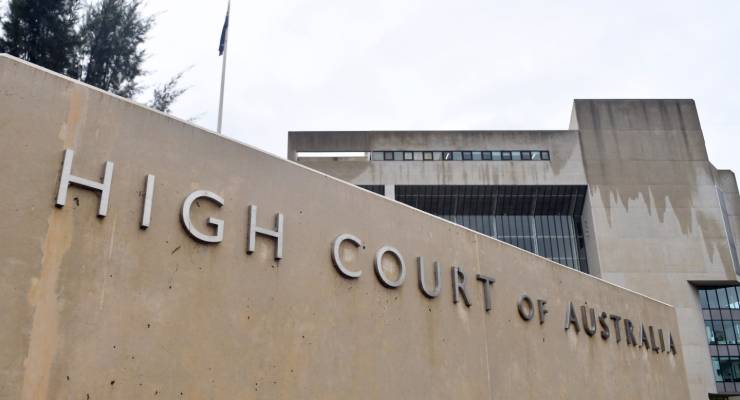
The federal government has begun releasing people held in indefinite immigration detention after the High Court ruled on Wednesday that the practice was illegal.
The decision overturned a 20-year legal precedent that Australia had the legal authority to hold visa-less non-citizens who could not be deported for as long as it saw fit. The exact number of detainees released (or approved for release) was not confirmed by the Department of Home Affairs, but it’s expected that hundreds could be affected.
So what sparked the decision? How many people will and won’t be released? What’s at stake for the government if they’re not released? How does the “character concerns provision” fit into all of this? What does everyone have to say about the ruling? Crikey clarifies.
What sparked the decision?
Wednesday’s landmark High Court ruling was made in relation to the case of a stateless Rohingya man known as NZYQ. According to court documents, he first arrived in Australia in 2012 as a refugee by boat and was held in immigration detention until being granted a bridging visa in 2014. In 2015, NZYQ was arrested and charged with a child sexual offence (at which point his bridging visa was cancelled), convicted, jailed, and released on parole in 2018. He was immediately detained by immigration as an “unlawful non-citizen”, denied a protection visa on safety grounds, and nominated for deportation to another country (albeit no other country was available to accept him).
Foreign Minister Penny Wong confirmed in question time on Thursday that NZYQ had been released following the decision by the High Court that ongoing and indefinite detention with “no real prospect” of removal from Australia in the “foreseeable future” was illegal. In short: the government cannot keep someone locked up without an actionable plan to resettle them. It’s considered punishment, and immigration officials are not legally authorised to dish that out.
The decision rewrote a two-decades-long precedent set in the 2004 case of Al Kateb and Al Khafaji, which greenlit the prospect of life in immigration detention — no right to stay in Australia but no option to leave.
How many will and won’t be released?
The Department of Home Affairs did not respond by deadline to Crikey’s questions about how many people in immigration detention had been released or were scheduled for release, and how many would not be subject to release, following Wednesday’s high court ruling.
Solicitor-General Stephen Donaghue told the court on Wednesday that Home Affairs had flagged 92 people eligible for immediate release and a bigger pool of 340 long-term detainees likely impacted by the decision.
Of the 92-person cohort, 83 had visas cancelled or refused due to “character concerns”, 78 were refugees unable to return to their country of origin because of a “well-founded fear of persecution”, and 14 were considered stateless or legally unidentifiable.
The government is now facing potential financial liability if it fails to release those affected.
How many people are in Australian immigration detention?
As of August 31, 2023, Home Affairs data showed there are 1,056 people in Australian immigration detention facilities (not inclusive of community locations) and a further 282 people in community detention. Of the 1,056 people in facilities, it states that 966 had a criminal history and 130 came to Australia by boat seeking asylum.
The average time spent in detention was 709 days, with 361 people confined in closed detention for more than two years and 198 people held for two-plus years in community detention. There are currently 73 children in community detention.
What’s meant by ‘character concerns’?
“Character concern” is a term included in the Migration Act 1958 defined as a non-citizen with a “substantial” criminal past, a poor track record in detention (formally, someone who has committed and been convicted of a crime while in immigration detention or during an attempted or successful escape from lock-up), a link into criminal networks, or simply someone that the minister “reasonably suspects” of the aforementioned criminal undertakings. “In the event that the non‑citizen were allowed to enter or to remain in Australia, there is a risk that the non‑citizen would engage in criminal conduct in Australia … or represent a danger to the Australian community,” the act states.
It was revealed that of the 92 detainees eligible for immediate release, 21 were flagged for review by the home affairs minister due to “national security, cybercrime, serious and high profile organised/gang-related [or] high ranking [outlaw motorcycle gangs] members” related character concerns, 27 went to the immigration minister for consideration of “violent offences, crimes against children [or] family/domestic violence”, and 35 decisions were palmed off to ministerial delegates.
The character concerns provision has been a favourite talking point of the Coalition, whose members have argued the release of these “problematic individuals” would pose a threat to the nation.
The High Court deemed the nomination of “character concern” was the jurisdiction of a court of law. No more “playing God” for the minister.
What are everyone’s thoughts on the matter?
The Refugee Council of Australia said the decision was a “welcome step” and called on the immigration minister to urgently review the cases of those currently detained. The same sentiment was echoed by the Asylum Seeker Resource Centre and Human Rights Law Centre which appeared as “amici curiae — friends of the court” to endorse the illegality of indefinite detention.
Australian UN High Commissioner for Refugees Adrian Edwards said the decision would be a first step to put Australian immigration practices in lockstep with international law.
Executive director of Refugee Legal David Manne said the decision to ensure detention could “no longer be forever” was of profound consequence, while University of Sydney Law School immigration law expert Mary Crock wrote that it was a “revolutionary result”.
As for politics, the Coalition went hard on the government’s lack of readiness and failure to have a “plan B” in place should the High Court ruling go as it did, while the Greens said the ruling was evidence that indefinite detention was a reality (despite the government’s assertions that it wasn’t) and requested the immediate release of “anyone being held in contravention of this ruling”.








You’d think the government would be quietly thanking the court for giving it cover to end the completely unconscionable practice of indefinite detention. No democratic country which respects human rights should ever be OK with that. If the Opposition wants to make a fuss, the government can just point at the ruling.
[As an aside: nice to be able to actually comment on an article again, without being blocked by the yellow no-comments field of death!]
You would think that, if you haven’t noticed all those runs on the board indicating that although the ALP likes to make a lot of pretty noises in contrast to to the LNP, their actual deeds have a much greater contrast with decency.
Some of the examples make it quite clear that this isn’t a matter of the ALP running scared from the MSM. There’s never any effort to shift the Overton window, and they always apparently cave in to the right wing framing of issues, almost as if that’s how they like it.
I must be in a minority; to my mind, this crap about people being unsuitable for our country sounds like unjustifiable exceptionalism: ‘our country is too good for you; you belong in one of those countries who don’t have our oh-so-virtuous values.’
I mean come on. How can this sort of puerile sentiment be so enshrined? It’s absurd. Then again, I suppose pandering to people’s vanity with drivel that can’t survive the merest scrutiny is the LNP’s stock in trade… And the Alternative Liberal Party’s true colours can be seen every time the Greens try to hold them to a higher standard.
It’s pathetic.
All those stateless people and refugees should be granted bridging visas and after two years granted citizenship. Mean spirited and populist as always the LNP doubled citizenship eligibility to four years.
Well, finally a topic we can comment on, but I’m so pissed off I can’t be bothered.
They will have to find another way of ensuring those incompatible with Australian society are prevented from enjoying it.